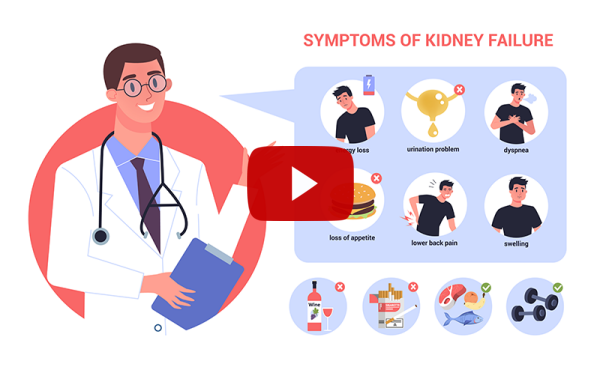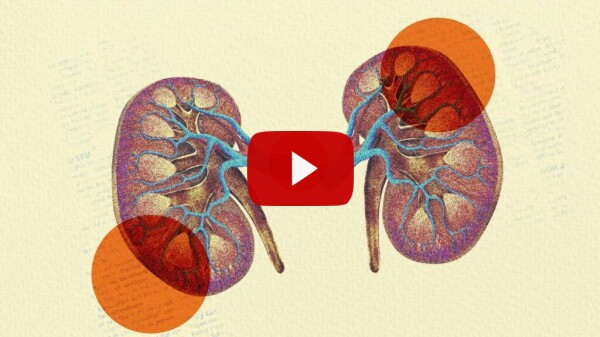Kidney failure, also known as renal failure, is a serious condition affecting millions of people worldwide. The kidneys, often overlooked, play a vital role in maintaining overall health by filtering waste, balancing electrolytes, and regulating blood pressure. Unfortunately, kidney disease symptoms can be subtle and easily ignored, leading to late diagnoses and severe complications. Understanding the early signs and symptoms of kidney failure is crucial for early intervention.
This blog post aims to educate readers on the various aspects of kidney failure, including causes, symptoms, and treatment options. We will explore the nuances of acute renal failure and chronic kidney disease, shedding light on how to maintain renal health and when to seek medical attention.

What is Renal Failure?
Renal failure occurs when the kidneys lose their ability to function normally. This can happen abruptly (acute renal failure) or gradually over time (chronic kidney disease). The kidneys are located on either side of the spine in the lower back, functioning to filter waste and maintain fluid and electrolyte balance. When kidney function declines, waste accumulates in the blood, leading to a host of complications.
What causes kidney failure? Various factors contribute to this condition, from diabetes and hypertension to infections and genetic disorders. Additionally, certain medications and toxins can affect kidney health, emphasizing the importance of understanding what works for our bodies.

Signs of Kidney Failure – Recognizing the Symptoms
Recognizing the signs of kidney failure is essential for early diagnosis and intervention. Common symptoms include:
- Fatigue: A decline in kidney function can lead to a buildup of toxins, causing feelings of exhaustion.
- Swelling: Fluid retention due to impaired kidney function can cause swelling in the legs, ankles, and face.
- Changes in Urination: Increased frequency, urgency, or changes in urine color may indicate kidney issues. This includes the darkening of urine, foamy appearance, or blood in urine, all signaling potential kidney dysfunction.
In addition to these symptoms, it’s vital to pay attention to subtle changes in overall health. The early signs of kidney failure can easily be mistaken for other conditions, which is why regular check-ups and kidney function tests play a significant role in maintaining kidney health.

Acute Renal Failure vs. Chronic Kidney Disease
Acute renal failure develops suddenly and often results from a specific cause, such as severe dehydration, an infection, or medication toxicity. This type can be reversible if addressed promptly. Conversely, chronic kidney disease progresses slowly, often due to long-standing issues like diabetes or hypertension. Unlike acute renal failure, it usually cannot be reversed but can be managed through lifestyle changes and medical intervention.
Understanding the differences between these two conditions is crucial. Early detection of acute renal failure can prevent irreversible kidney damage, whereas recognizing chronic kidney disease enables patients to implement management strategies to slow its progression.

What are the Stages of Chronic Kidney Disease?
Chronic kidney disease (CKD) is typically classified into five stages based on the glomerular filtration rate (GFR). Each stage indicates how well the kidneys are functioning:
- Stage 1: Normal or near-normal GFR (90 or higher).
- Stage 2: Mildly reduced GFR (60-89).
- Stage 3: Moderately reduced GFR (30-59).
- Stage 4: Severely reduced GFR (15-29).
- Stage 5: End-stage renal disease (ESRD) requiring dialysis or a kidney transplant (GFR lower than 15).
Awareness of these stages is critical for anyone at risk of kidney problems. Regular kidney function tests can help monitor progress and modify treatment plans to preserve function for as long as possible.

Causes of Kidney Failure – What Leads to Renal Dysfunction?
Understanding the causes of kidney failure is essential for prevention and effective management. Common reasons include:
- Diabetes: High blood sugar levels can damage blood vessels in the kidneys, leading to decreased function.
- Hypertension: Elevated blood pressure can cause damage to renal blood vessels over time, leading to kidney compromise.
- Obstructive Issues: Conditions like kidney stones or tumors can block urine flow, increasing kidney pressure and impairing function.
By addressing these preventable causes early on, individuals can significantly reduce their risk of developing renal failure.

Symptoms with Kidney Failure – Beyond the Basics
In addition to the common symptoms mentioned earlier, kidney failure can manifest in specific ways:
- Nausea and Vomiting: The accumulation of toxins due to failing kidneys can lead to gastrointestinal distress.
- Loss of Appetite: Discomfort and hormonal changes might cause food preferences to change.
- Sleep Issues: Fluid retention can interfere with sleep patterns, leading to insomnia.
These complications severely impact quality of life. Being aware of these symptoms can help individuals detect kidney issues more effectively and seek timely medical advice.

How to Diagnose Kidney Failure
To determine if kidney failure is present, healthcare professionals employ various diagnostic tools, including:
- Blood Tests: Measuring creatinine and blood urea nitrogen (BUN) levels can indicate kidney health.
- Urine Tests: Analyzing protein, glucose, and other substances in urine can reveal dysfunction.
- Imaging: Ultrasounds or CT scans provide a visual understanding of kidney structure and function.
Timely diagnosis is essential for effective treatment. Recognizing the early signs of kidney problems can lead to better outcomes and improved quality of life.

Treatment Options for Kidney Failure
The treatment of kidney failure depends on the underlying cause and the severity of the condition. Options may include:
- Medications: Certain drugs can manage symptoms and slow disease progression. These might include blood pressure medications or erythropoiesis-stimulating agents.
- Dietary Changes: A kidney-friendly diet can significantly improve kidney function and overall health. Limiting potassium, phosphorus, and sodium intake is often recommended.
- Dialysis: In severe cases, dialysis may be necessary to filter waste from the blood when kidneys can no longer perform this function.
Exploring these options can help patients make informed decisions about their health and recovery.

Can Kidney Failure Be Reversed?
A common question arises: can kidney failure be reversed? The answer largely depends on the type of failure. Acute renal failure may be reversible with the right interventions and timely treatment. In contrast, chronic kidney disease often necessitates a focus on preservation rather than reversal.
Understanding this distinction emphasizes the critical need for monitoring and treatment of any kidney dysfunction to maintain optimal health.

Conclusion – Empowering Yourself Against Kidney Failure
Knowledge about kidney failure is power. By understanding symptoms, causes, and treatment options, you can take action to protect your renal health. Regular screenings and paying close attention to your body’s signals are paramount in catching any potential issues early.
Live a healthy lifestyle by balancing diet and exercise, managing chronic conditions, and being aware of medications. With the right awareness and action, you can mitigate the risk of kidney failure and lead a healthy life.
